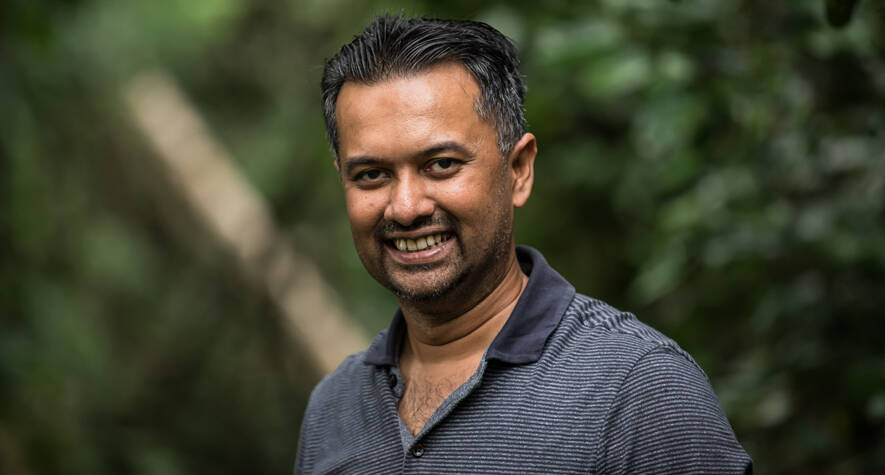Meet the entrepreneur who built a £22m tea business
Suranga Herath’s English Tea Shop is booming – despite Britain’s booming love affair with coffee.
Britain is famous for its tea drinkers. But in light of the coffee shop chains crowding every high street and the surging popularity of espresso pods and single origin beans you could be forgiven for thinking we’d abandoned our traditional fondness for a pot of English breakfast.
That hasn’t stopped the English Tea Shop raking in megabucks. Founded in 2010 by the owners of a Sri Lankan tea factory (but headquartered in the UK), the brand has grown 60% year-on-year, reaching revenues of £22m last year, including £8m in the UK.
The company sells 350 million tea bags each year, with more than 130 varieties – from boring old Earl Grey and chamomile to chocolate rooibos and vanilla. It employs 400 people in Sri Lanka as well as a five-person commercial team based in London. MT had a chat with its CEO Suranga Herath about trends in the tea industry and his plans for the future.
How did you get the business off the ground?
I’ve been in tea all my life, for 20 years. It would be nice to say there was a scientific rationale behind the founding of English Tea Shop. We used to be a factory packing other people’s brands. In 2008 we were packing 70 different brands for the US, UK and Europe.
It was that experience that led us to believe we would do something greater. We still have the manufacturing plant but we gave up almost all of the private label business we did. We knew that we could take the market by storm if we took a different approach. We’re not just another organic brand who’s competing with the rest – we have authentic provenance from farm to cup – that’s core to us. We like celebrating the Sri Lankan tea industry, which is born out of English tradition. 80% of our products are sourced from Sri Lanka and we pack all of them ourselves.
You’ve been exporting since day one. Why did you take that approach and what advice would you give to exporters?
The brand was born partly because of the demand in the US for a British brand. It was only in later 2012 or 2013 that we really started selling in the UK, and by then we already had about 15 markets including France, Germany, Singapore and Australia.
For us it came naturally. My message to others would be that it need not be as difficult as it is said to be. If you have a learning mindset, and you’re flexible enough to change and meet the demand of the local cultures, you don’t need to have fully fledged offices in every country. We are in 50 countries but that doesn’t mean we have to have marketing teams in each of them.
How concerned are you about the potential impact of Brexit?
Personally I don’t like the idea of moving away from a union that’s been formed with great difficult over a long period of time. But these things happen, and it’s down to the people to decide. As a business, one of our immediate worries was around the exchange rate. When we saw the pound crash by 15-20% within a very short time frame, obviously we lost some of the profits we make. But it also became an opportunity. In the last year we grew by 45% – I’m not saying it’s because of Brexit, it’s despite Brexit. I just hope the new government approaches the negotiations with a lot of maturity.
How would you describe your approach to business?
Value sharing is the foundation on which the entire business is built. It’s inspired by the Creating Shared Value concept introduced by the Harvard Business School professor Michael Porter. We’re empowering our employees to think entrepreneurially. We have open book management, we are crowdsourcing our strategy, we pay out profit shares every quarter. Just last year, we paid out five and a half basic months’ salary to all 400 people in profit shares.
What are the key trends in the tea industry?
The conventional tea industry has been flat for a long time. But we’ve seen an opportunity in speciality teas – herbal teas, and black and green teas mixed with various spices and flowers. That side of the business is growing very rapidly, and so is the organic food sector.
What do you do on a typical day?
50% of my time I’m travelling across markets and to Sri Lanka where we manufacture the tea. I arrived from London yesterday (Wednesday) night and I’m back in London on Monday. My days are mostly living out of a suitcase and in and out of planes and hotels. it’s great, you’ve got to really enjoy what you’re doing. But I’m blessed because I’ve got a great team to rely on so that allows me to focus on the key program of the business.
What is your plan for the next 12 months?
We have a very ambitious plan. We want to double our turnover in the UK in five years – we think we will achieve a minimum 25% growth in the UK this year. Globally I think we’ll have the same kind of growth.
How about in the long-term, would you ever sell to a big FMCG company?
I think all of us are very very committed to the brand, it’s an emotional, once in a life time connection. So I don’t see us selling in the future.
Article by Jack Torrance
